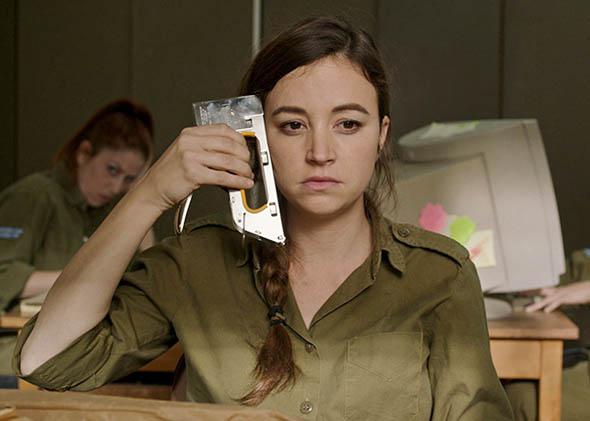Just a few minutes into the Israeli film Zero Motivation, we’re introduced to a staple gun—a prized possession kept hidden in an Israel Defense Forces filing cabinet. What at first seems like a joke—Daffi (Nelly Tagar) describes it as “the most precious thing in the office”—is actually the most powerful instrument she has. It also, of course, conforms with the Chekhovian adage, returning in Act III for a climactic and bloody staple-gun fight. That scene, like the rest of Talya Lavie’s wonderful and poignant directorial debut, is a hilarious and macabre meditation on feeling totally and utterly helpless.
Zero Motivation, the winner of six Israeli Academy Awards and the Best Narrative Feature Award at this year’s Tribeca Film Festival, merits a lot of comparisons. The promotional material describes the film as M.A.S.H. meets Orange Is the New Black, while others have found it reminiscent of Stripes. There are hints of all of these, but, if you must use a pitch-meeting formulation, this is the most apt: Zero Motivation is what you would get if the Coen brothers directed an episode of Broad City in Israel. With offbeat humor, it follows the misadventures of two best friends who aren’t above eating grilled cheese off the floor.
Divided into three chronologically ordered episodes, Zero Motivation tells the story of Daffi and Zohar (Dana Ivgy), who have a seat-saving, earbud-sharing kind of friendship. They are brought together by their dim circumstances, fulfilling their mind-numbingly boring mandatory army service as a paper shredder and a coffee gofer, jobs they don’t actually do. Instead they sit and complain, making snide comments (Zohar) or dreaming of leaving (Daffi). Although neither Daffi nor Zohar is funny in her own right, Lavie infuses their actions with deadpan humor, underlining the helplessness of their situation.
Zohar is morose, constantly sabotaging herself rather than doing her thankless, meaningless job. The only thing that cheers her up is Daffi, a sparkly eyed optimist who alternates between crying and doing every thing she can to escape her posting. She’s tried in vain to relocate to a romanticized Tel Aviv (where, in her daydreams, she crosses the street in uniform and high heels while surrounded by buildings instead of an endless expanse of sand), fruitlessly drafting letters with Zohar to superiors—like the ramatkal, the commander in chief—asking for a transfer. After all, they’re stationed at the Shizafon army base, a location that seems removed from all time and space—at one point there’s a mention of the year 2003, but aside from a plot-necessitating dependence on paper, there is no indication of anything to fix the base in any real-world era. The bulky, anachronistic computers are primarily used for Minesweeper competitions—a nod to the fact that, despite being in the army, Daffi and Zohar aren’t near any real mines or anything remotely armylike, unless you count bureaucracy. (Readers of Shani Boianjiu’ excellent 2012 novel The People of Forever Are Not Afraid, will be familiar with many of the ways the IDF is experienced by women, and will even appreciate the similarities in tone, with the banal seamlessly transforming into the absurd in ways that can be surprisingly terrifying.)
While most military films are told from a male perspective, here men are secondary to the plot, patronizing the female soldiers and staring at their butts. Unlike the men, the women are confined to the base, perennially stuck carting coffee. At one point, Zohar, assigned to solo watch duty—everyone else is paired off—is told, “You want equal rights? This is what you get.” Of course, that’s not equal rights, but the sentiment bleeds deeper cast against the film’s unsubtle depiction of army culture.
In a movie that takes place in Israel, where army service is compulsory and war is often part of daily life, heavy political themes might seem like a given. And while the officers in the film occasionally remark that the army is not, in fact, the joke that it’s made out to be—and others repeat the refrain that “there’s a war going on”—we never feel the broader geopolitical context. These characters are isolated and disconnected from any reality, and therefore so are we. The setting may be the IDF, but it could be any suffocating office job. In Israel, one’s first job usually just happens to be in the army.
Which gets to a deeper point: In Israel—a country that has been defined by its regional conflicts since its inception—domestic issues have only recently begun to take up more space in political discussions. Now the conversation has broadened to include topics like education and housing, as exemplified by the election of Yair Lapid to the Knesset last year, Lavie may not have had such things in mind, but with its focus on the mundanity of everyday life, the film benefits from that context. Setting such a story in the military makes that point even clearer—the army is concerned with border safety, and that can come at the price of what’s happening within those borders.
Each of the movie’s sections starts out optimistic enough, only to be darkened by a sudden twist. A story involving a new soldier takes an abrupt turn resulting in a bloody tragedy. Part 2, “The Virgin,” starts with a meet-cute at gunpoint and ends with a guy simulating sex with a garbage can, also at gunpoint. The mundane becomes absurd, and the hilarious turns to hilariously gruesome. Sometimes that humor underlines the characters’ struggles: In one scene, a female officer runs toward the desert sunset covered in the shredded paper that in Lavie’s film is symbolic of so many things.
While there may be nuances lost in translation—the fact that Zohar grew up on a kibbutz, or the relevance that one of her officemates is a Russian immigrant—the overall aims of Zero Motivation should be affecting to people who have ever felt like life was going nowhere. Everything is futile, till it’s not—especially if your friend is nearby.
